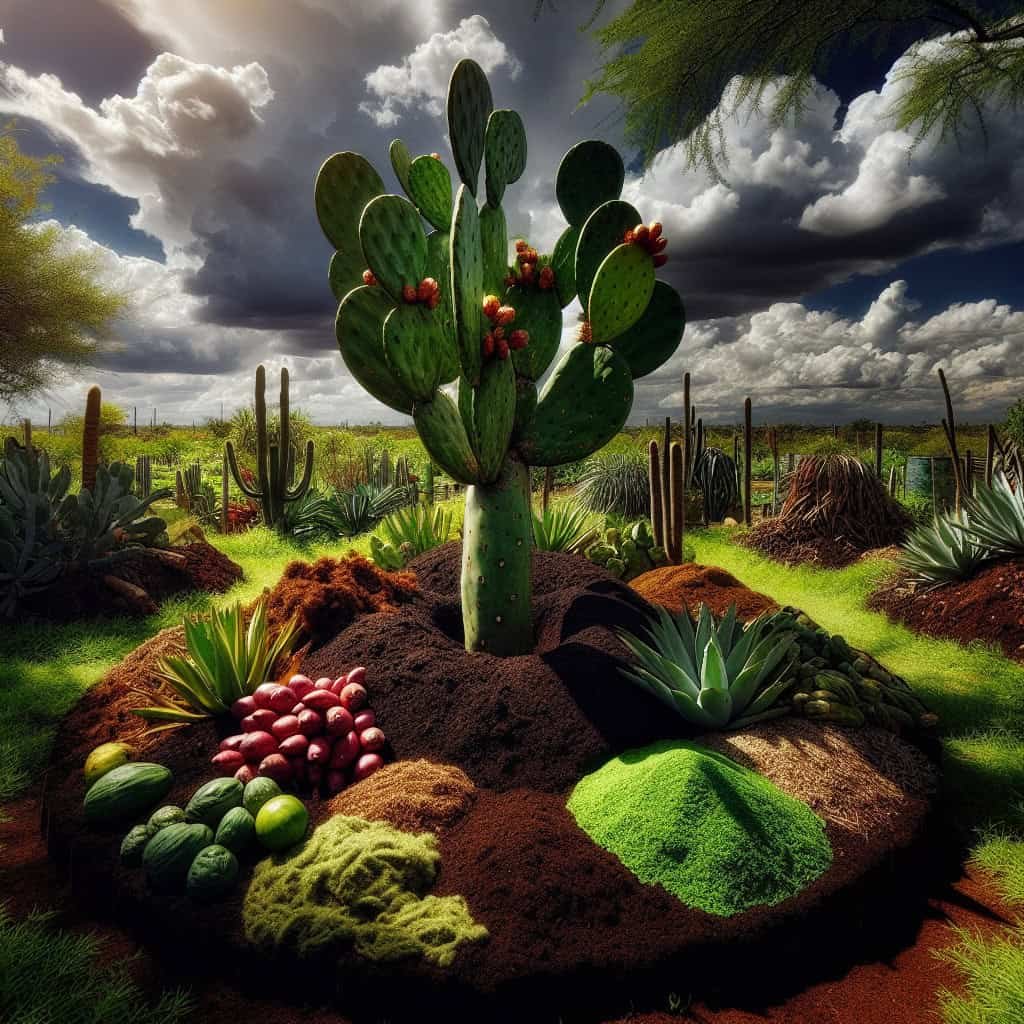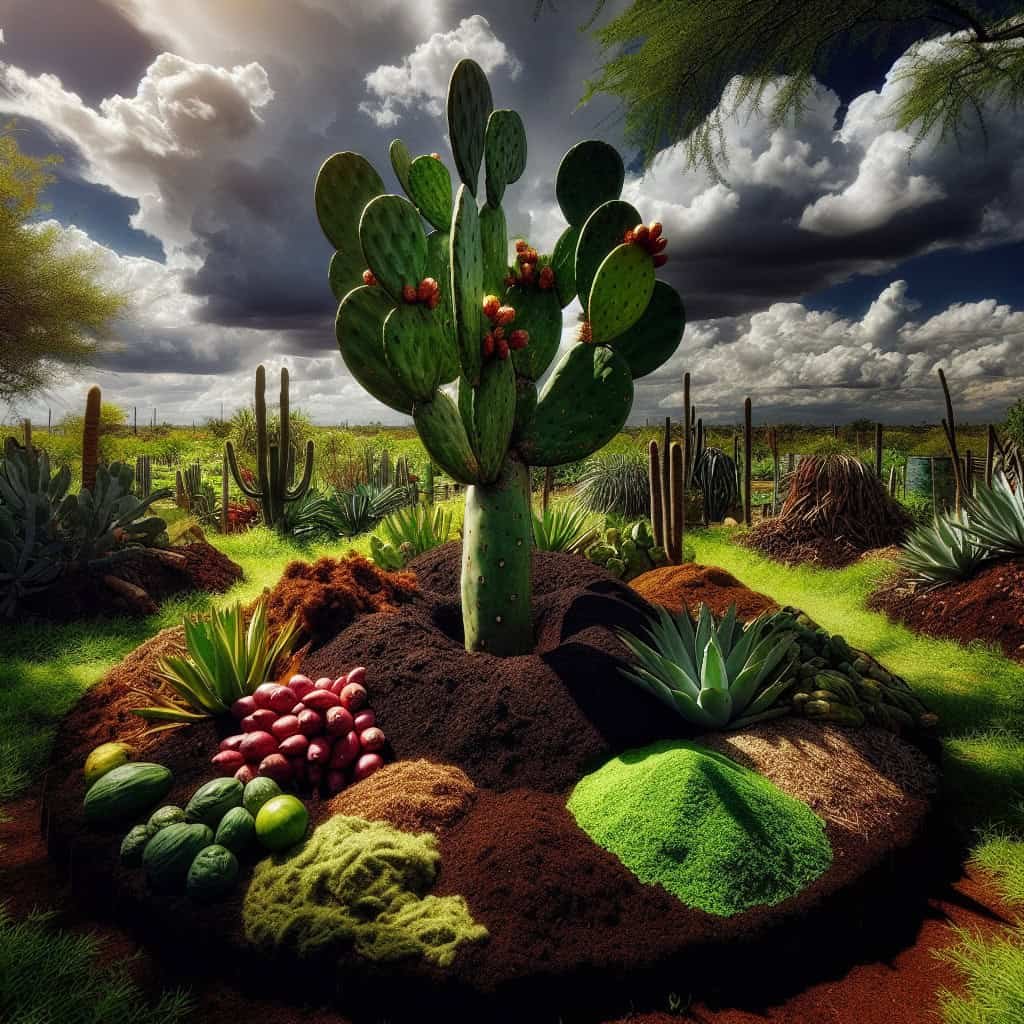If you’ve ever wondered whether organic fertilizers are suitable for cultivating nopal, you’re in luck! In this article, we’ll explore the question of whether or not organic fertilizers can be effectively utilized for nopal cultivation. So, if you’re a fan of this versatile and nutritious plant, keep reading to discover the answers you’ve been seeking.
Choosing Organic Fertilizers for Nopal Cultivation
If you’re considering cultivating nopales, also known as prickly pear cactus, you may be wondering whether organic fertilizers are a suitable option. The good news is that organic fertilizers can indeed be used for nopal cultivation, offering a range of benefits for both your plants and the environment. In this comprehensive guide, we will explore the benefits of organic fertilizers, the different types available, key factors to consider when choosing them, and much more. So let’s dive in and discover how you can make the best choices for your nopal cultivation!
Understanding the Benefits of Organic Fertilizers
When it comes to fertilizer options for nopal cultivation, organic fertilizers offer numerous advantages over synthetic counterparts. First and foremost, organic fertilizers enhance soil health and fertility. They improve soil structure, promote beneficial microbial activity, and provide essential nutrients in a slow-release manner, ensuring a sustained supply of nourishment for your nopal plants.
Furthermore, using organic fertilizers reduces the environmental impact of your cultivation practices. Unlike synthetic fertilizers, organic alternatives are derived from natural sources and are free from harmful chemicals. By choosing organic, you contribute to healthier soil, reduce water pollution, and support biodiversity within and beyond your fields.
Last but certainly not least, organic fertilizers can significantly improve crop yield and quality. They provide a holistic approach to plant nutrition, offering a balanced blend of nutrients that ensures optimal growth and development of your nopal plants. With organic fertilizers, you can expect robust and vibrant nopales, ready to be harvested for their nutritious pads.

Types of Organic Fertilizers for Nopal Cultivation
Before delving into the key factors to consider in choosing organic fertilizers, let’s explore the different types available in the market. Understanding these options will help you make informed decisions about which organic fertilizers best suit your specific nopal cultivation needs.
Animal-Based Fertilizers
Animal-based organic fertilizers include materials derived from animals, such as manure and bone meal. These fertilizers provide a rich source of nutrients, including nitrogen, phosphorus, and potassium (NPK), essential for plant growth. They are typically slow-release in nature, allowing nutrients to be gradually released into the soil, ensuring sustained nourishment for your nopal plants.
Plant-Based Fertilizers
Plant-based organic fertilizers consist of materials derived from plants, such as compost, seaweed extracts, and crop residues. These fertilizers offer a wide range of essential nutrients and organic matter that enrich the soil and enhance its fertility. They also promote beneficial microbial activity, improving soil structure and nutrient availability for your nopal plants.
Mineral-Based Fertilizers
Mineral-based organic fertilizers are derived from naturally occurring minerals and rocks, such as rock phosphate and greensand. These fertilizers provide essential nutrients in a slow-release form, ensuring prolonged availability for your nopal plants. Mineral-based fertilizers are particularly beneficial for optimizing nutrient ratios and addressing specific deficiencies in your soil.
Key Factors to Consider in Choosing Organic Fertilizers
Now that you have a better understanding of the types of organic fertilizers available, it’s essential to consider certain factors to ensure you make the right choice for your nopal cultivation. Let’s explore these key factors in detail.
Nutrient Content and Availability
When choosing organic fertilizers for your nopales, it’s crucial to assess their nutrient content and availability. Look for fertilizers that provide a balanced blend of essential nutrients, especially nitrogen, phosphorus, and potassium (NPK). Nopales require varying ratios of these nutrients at different growth stages to ensure healthy development. Additionally, consider the availability of these nutrients in the fertilizer, as some organic options may release nutrients slowly over time, while others provide quicker nutrient availability.
Slow Release vs. Quick Release Fertilizers
Slow-release organic fertilizers are beneficial for nopal cultivation, as they gradually release nutrients over an extended period. This ensures a steady supply of nourishment for your plants while minimizing the risk of nutrient leaching or runoff. Quick-release fertilizers, on the other hand, provide an immediate burst of nutrients but may require more frequent applications. Consider the growth stage of your nopales and the specific nutrient requirements to determine which type of organic fertilizer suits your needs best.
Cost and Availability
Cost and availability are practical considerations when choosing organic fertilizers. Evaluate the cost per pound or per unit of nutrient content to compare different options. Additionally, assess the availability of the organic fertilizers in your region or local market. It’s essential to ensure that you can consistently access the fertilizers you choose for your nopal cultivation.
Compatibility with Other Farming Practices
Consider the compatibility of organic fertilizers with other farming practices you employ. Some organic fertilizers may require specific application techniques or may interact with certain soil amendments or pest management strategies. Assess how the organic fertilizers align with your overall farming system to ensure that they contribute positively to the health and productivity of your nopal plants.

Understanding Nutrient Requirements of Nopal
To make informed decisions about organic fertilizer selection, it’s crucial to understand the nutrient requirements of nopal. Nopales have specific nutritional needs at various growth stages, and providing the right balance of nutrients is essential for optimal plant health and productivity.
Essential Nutrients for Nopal Growth
Nopales require a range of essential nutrients for healthy growth and development. These include nitrogen (N), phosphorus (P), potassium (K), calcium (Ca), magnesium (Mg), sulfur (S), and micronutrients like iron (Fe), manganese (Mn), zinc (Zn), copper (Cu), and boron (B). Understanding the specific nutrient requirements of your nopal plants at different growth stages will help you select organic fertilizers that address these needs effectively.
Nutrient Deficiencies and Excesses
Imbalances in nutrient supply can lead to nutrient deficiencies or excesses in your nopal plants, affecting their health and productivity. Common nutrient deficiencies in nopales include nitrogen deficiency, characterized by stunted growth and yellowing of older leaves, and phosphorus deficiency, resulting in weak root development and decreased flowering. On the other hand, nutrient excesses can lead to toxicity symptoms, often seen as leaf scorching or discoloration. By selecting organic fertilizers that provide a balanced blend of nutrients, you can minimize the risk of deficiencies or excesses.
Balancing Nutrient Ratios
Finding the right balance of nutrients is key to promoting healthy nopal growth. These ratios can vary depending on the specific growth stage of your nopales. For instance, younger plants may require higher nitrogen levels for vigorous foliage growth, while older plants may benefit from increased potassium levels to support flowering and fruit production. Understanding these nutrient ratios and selecting organic fertilizers that align with these requirements will help ensure optimal growth and productivity for your nopales.
Considering Soil Health and pH Balance
Nopales thrive in soils with good structure, adequate drainage, and a balanced pH level. Therefore, it’s essential to consider soil health and pH balance when choosing organic fertilizers for your nopal cultivation.
Assessing Soil Composition
Before selecting organic fertilizers, assess the composition of your soil. Conduct a soil test to determine its nutrient content, pH level, and organic matter content. This will help you identify any deficiencies or imbalances that can be addressed by specific organic fertilizers. Additionally, understanding your soil composition will guide you in making informed decisions about the appropriate amount and frequency of organic fertilizer applications.
pH Adjustment and Its Impact on Nopal
Nopales prefer slightly acidic to neutral soil pH, typically ranging from 6.0 to 7.0. If your soil pH is outside this range, it’s important to consider organic fertilizers that can help adjust the pH over time. Acidic amendments, such as elemental sulfur or organic matter like peat moss, can be used to lower pH levels, while alkaline amendments like wood ash or agricultural lime can be added to raise pH levels. Balancing the pH of your soil ensures optimal nutrient availability and uptake for your nopal plants.
Improving Soil Structure and Drainage
Organic fertilizers not only provide essential nutrients but also contribute to improving soil structure and drainage. Nopales thrive in well-drained soils, as excessive moisture can lead to root rot and other diseases. Organic matter-based fertilizers, such as compost or well-rotted manure, can improve soil structure by increasing its water-holding capacity and enhancing its ability to retain nutrients. These organic fertilizers also promote beneficial microbial activity in the soil, further improving its overall health and fertility.

Organic Fertilizer Application Techniques
Once you have selected the suitable organic fertilizers for your nopal cultivation, it’s important to understand the various application techniques available. Different methods can be employed based on factors such as plant size, fertilizer type, and soil conditions. Let’s explore some common organic fertilizer application techniques for nopales.
Surface Application
Surface application involves spreading organic fertilizers evenly over the soil surface around the base of the nopal plants. This method is suitable for granular or pelleted fertilizers and is commonly used when plants are small or established. Watering or rainfall will gradually incorporate the fertilizer into the soil through natural processes.
Incorporation into Soil
For larger nopal plants, incorporation into soil is a preferred application method. In this technique, organic fertilizers are mixed or tilled into the top layers of soil, allowing for better nutrient distribution. This method is effective for both granular and powdered fertilizers, ensuring that the nutrients are in close proximity to the plant’s root zone for efficient uptake.
Foliar Application
Foliar application involves spraying a liquid organic fertilizer directly onto the leaves of nopal plants. This method allows for quick absorption of nutrients through the plant’s foliage. Foliar fertilizers are typically diluted and applied during the early morning or late afternoon to avoid excessive heat or direct sunlight, which can cause leaf burn. Foliar application is beneficial when immediate nutrient uptake is required or when foliar nutrient deficiencies are observed.
Top Dressing
Top dressing is a technique where organic fertilizers are applied around the base of nopal plants and gently worked into the top layer of soil. This method is particularly effective for granular or slow-release fertilizers. Top dressing provides a continuous supply of nutrients to the plants’ root zone, ensuring a sustained release of nourishment as the organic matter breaks down. It is commonly used on well-established nopales.
Drip Irrigation Method
The drip irrigation method involves applying liquid organic fertilizers directly through the irrigation system. This technique delivers nutrients directly to the plants’ root zone, providing efficient nutrient uptake without wastage. Drip irrigation is commonly used in larger scale nopal cultivation systems, ensuring precise and controlled application of organic fertilizers.
Composting as a Sustainable Fertilizer Option
In addition to using commercial organic fertilizers, composting offers a sustainable and cost-effective approach to nourishing your nopales. Compost is a nutrient-rich, organic soil amendment that promotes soil health, improves water retention, and provides essential nutrients for plant growth.
Benefits of Compost for Nopal
Compost improves soil structure and fertility by enhancing microbial activity and promoting nutrient cycling. It increases the water-holding capacity of soil, reducing irrigation needs and minimizing the risk of water stress for your nopales. Additionally, compost adds organic matter to the soil, improving its long-term fertility and reducing the need for external inputs.
Compost Preparation and Application
To prepare compost, collect and combine organic materials such as kitchen scraps, yard trimmings, and plant residues. Ensure a good balance of green (nitrogen-rich) and brown (carbon-rich) materials, and provide proper aeration and moisture for decomposition. Composting can take several weeks to months, depending on the method used.
Once your compost is ready, apply it by top dressing or incorporating it into the soil. Aim for a layer of compost around 1-2 inches thick and gently work it into the top layer of soil. Compost can be used as a standalone fertilizer or in combination with commercial organic fertilizers to provide a holistic nutrient supply for your nopales.
Composting Dos and Don’ts
When composting, it’s important to follow some essential dos and don’ts. Do include a variety of organic materials, such as kitchen scraps, yard waste, and plant residues, as this will create a diverse nutrient profile in your compost. Do ensure adequate aeration and moisture to facilitate the decomposition process. Turn the compost pile regularly and keep it moist, but avoid excessive watering, which can make the compost too soggy and hinder decomposition.
On the other hand, don’t include meat, dairy products, or oily materials in your compost, as these can attract pests and slow down decomposition. Don’t use fresh or diseased plant materials, as they can introduce pathogens into the compost. Avoid composting weed seeds, as some may survive the composting process and later germinate in your nopal beds.

Comparing Organic and Synthetic Fertilizers
As you consider the use of organic fertilizers for your nopal cultivation, it’s helpful to understand how they compare to synthetic fertilizers. While both types have their merits, organic fertilizers offer distinct advantages in terms of nutrient composition and environmental impact.
Differences in Nutrient Composition
Organic fertilizers provide a more complex and diverse nutrient profile compared to synthetic fertilizers. They contain not only primary macronutrients (nitrogen, phosphorus, and potassium) but also secondary macronutrients (calcium, magnesium, and sulfur) and essential micronutrients. This comprehensive nutrient blend helps ensure balanced nutrition for your nopal plants and encourages overall soil health.
Synthetic fertilizers, on the other hand, are typically formulated to provide specific nutrients in concentrated forms. While they may offer a quick source of nutrients, they often lack the organic matter and microbial activity that contribute to long-term soil health and fertility.
Impact on Soil Microbial Communities
Organic fertilizers promote beneficial microbial activity in the soil, contributing to a healthy soil ecosystem. These microbes break down organic matter, release nutrients, and improve soil structure. Synthetic fertilizers, however, can have adverse effects on soil microbial communities. Their high salt content and chemical composition can disrupt the delicate balance of microorganisms, leading to a decrease in soil biodiversity and overall soil health.
Environmental and Health Considerations
Using organic fertilizers for nopal cultivation reduces environmental impacts compared to synthetic fertilizers. Organic options are derived from natural sources and are free from harsh chemicals, minimizing the risk of water pollution and soil degradation. Organic fertilizers also contribute to reducing greenhouse gas emissions and supporting sustainable farming practices.
Synthetic fertilizers, on the other hand, can have negative effects on the environment. Their production consumes significant amounts of energy and resources, contributing to carbon emissions and pollution. Synthetic fertilizers can also leach into water bodies, causing water pollution and eutrophication.
Considering these differences, organic fertilizers offer a more sustainable and environmentally friendly choice for nopal cultivation. By prioritizing organic options, you contribute to the long-term health of your soil and promote a more sustainable agricultural system.
Considerations for Organic Certification
If you are aiming for organic certification for your nopal cultivation, it’s essential to understand the specific requirements and regulations. Organic certification ensures that your cultivation practices align with organic standards and enables you to market your products as organic.
Certification processes vary by region, but they typically involve compliance with guidelines related to soil management, pest control, and fertilizer use. Organic fertilizers used in certified operations must meet specific criteria, such as sourcing from approved organic materials and adhering to strict quality standards.
To ensure compliance with organic certification, seek out organic fertilizers that are certified and labeled as suitable for use in certified organic operations. Additionally, keep detailed records of your fertilizer applications and comply with all organic regulations related to soil fertility management.
Common Organic Fertilizer Brands
Now that you have a comprehensive understanding of organic fertilizers for nopal cultivation, let’s explore some common organic fertilizer brands. Note that availability may vary depending on your location, so it’s important to research local options that meet your needs.
Brand A
Brand A offers a range of certified organic fertilizers specifically formulated for cactus and succulent plants. Their products are derived from natural sources and provide a balanced blend of nutrients to promote healthy nopal growth. Brand A’s slow-release granular fertilizers are particularly suitable for established nopales, ensuring a sustained nutrient supply.
Brand B
Brand B specializes in plant-based organic fertilizers that are ideal for enhancing the overall health and fertility of your soil. Their compost-based fertilizers are rich in essential nutrients and organic matter, helping improve soil structure and promote beneficial microbial activity. Brand B’s liquid fertilizers are also available for quick nutrient uptake through foliar application.
Brand C
Brand C offers a range of mineral-based organic fertilizers designed to address specific nutrient deficiencies in nopal cultivation. Their formulas include rock phosphate, greensand, and other naturally occurring minerals to provide essential nutrients in a slow-release manner. Brand C’s products are often preferred for achieving optimal nutrient ratios and balancing pH levels in the soil.
Be sure to research these brands further and consider factors such as nutrient content, application methods, and availability to determine the best organic fertilizers for your specific nopal cultivation needs.
In conclusion, choosing organic fertilizers for your nopal cultivation can greatly benefit your plants, your soil, and the environment. Organic fertilizers enhance soil health and fertility, reduce environmental impact, and improve crop yield and quality. By considering the types of organic fertilizers available, key factors in their selection, nutrient requirements of nopal, soil health considerations, and application techniques, you can make informed decisions to ensure the success of your nopal cultivation. Whether you choose to use commercial organic fertilizers or opt for composting as a sustainable option, organic fertilizers offer a reliable and environmentally friendly approach to nourishing your nopales. Happy growing!

